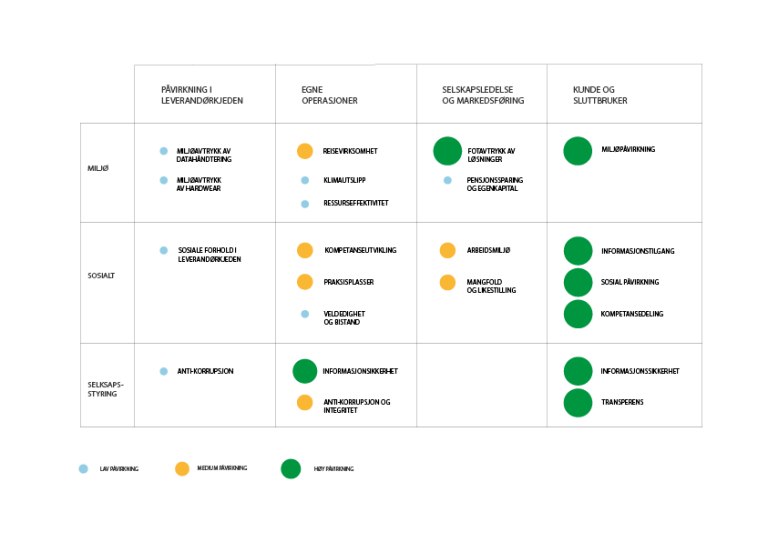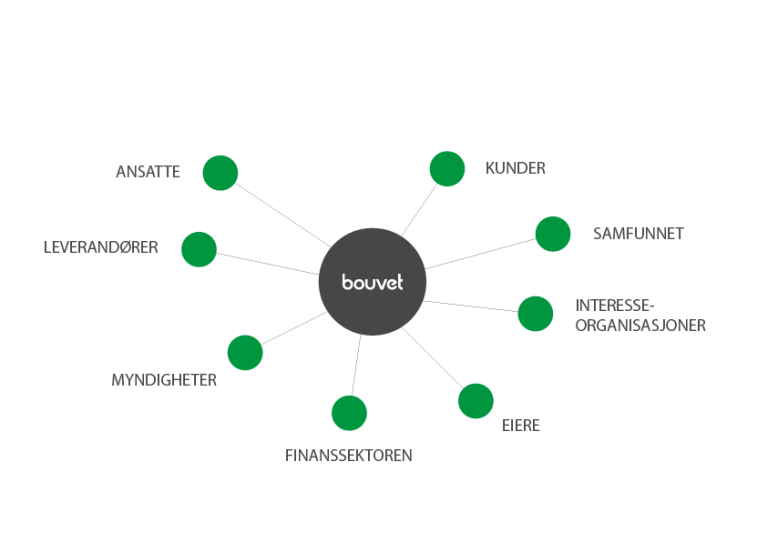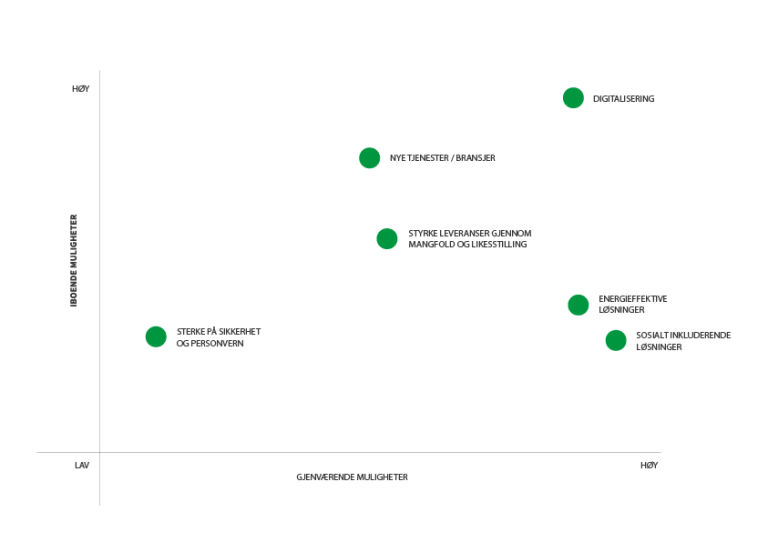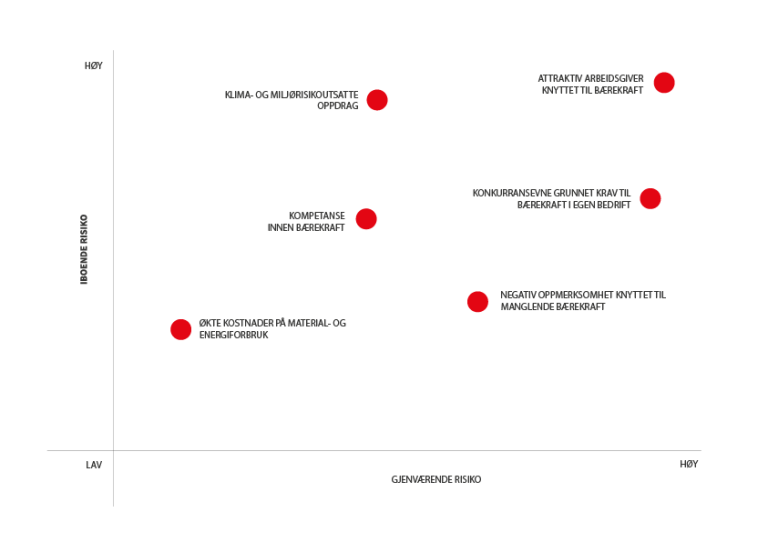In the autumn of 2020, we conducted a materiality analysis based on Euronext’s guidance on environmental, social and corporate governance (ESG) issues of January 2020. This aimed to identify sustainability areas which are important for us in terms of our size, our regional structure and a value set exemplified by freedom and engagement.

The materiality analysis was developed on the basis of insights obtained from employees with various roles in all our regions, interviews with stakeholders and a review of megatrends and regulation. It has identified what the various ESG components mean for us in terms of risks and opportunities, and thereby which areas will receive our attention to in the future.
As a consultancy, we can contribute our digital expertise and ability to deliver in such a way that we, society, our clients and other stakeholders are collectively able to move the world in the right direction. The breadth of our services and our client relationships in many key sectors mean that we can influence, directly or indirectly, all the UN’s sustainable development goals (SDGs). We have therefore not chosen any specific SDGs, but will work consciously in the future with these goals where appropriate. In that way, we can remain opportunity oriented – something which is important for us.
The materiality analysis will form the basis for our future work. How we prioritise measures and integrate sustainability in our business will be founded on our vision, ambition, long-term goals and values – in other words, our strategic platform.
While the analysis will be updated annually, priorities, implementation and communication will develop iteratively throughout the year.
Our value chain
As part of the work on the materiality analysis, a value chain analysis was conducted to illustrate our impact. Being conscious of this impact throughout our value chain is important for us, and for how we can find good ways to reduce our footprint in the time to come.

Environment and climate
Our environmental impact is greatest at the client level and in developing solutions. In collaboration with our clients, we have the potential to influence the world to a high degree in the right direction by participating in sustainability-focused projects. This potential applies particularly to clients in such emission-intensive sectors as oil and gas, public administration, the armed forces and transport – which account for a large part of our turnover.
As part of our assignments, we develop solutions which are useful for both client and society, but which also require energy. Overall power consumption by the ICT sector is high. We have the potential to help reduce this footprint through the way we advise our clients and by developing more energy-efficient solutions. This has consequences for the environmental impact of our own activities as well as those of our clients and their customers.
Our own data management has a low climate footprint. At the same time as we observe guidelines – such as those in the Eco-Lighthouse – on buying electronic aids, we should also make conscious efforts to reduce our environmental footprint.
We help to lessen the environmental impact of our travel activities by having offices close to traffic hubs, making provision for and encouraging employees to cycle to work, and having electric cars at some offices. To be conscious of the environmental impact of travel, this assessment must also be weighed for each journey.
Each of our employees can also contribute to improving our overall environmental footprint through their own travel activities and efficient use of resources, for example.
Social
We are a large player in a sector with few women in leading positions. As a group, we have the opportunity to contribute to increasing equality and diversity in our organisation and in the sector as a whole.
Employee surveys are conducted annually, and the one for 2020 shows that our workforce has a high level of job satisfaction and thrives with us. As a group, we have a high reputation internally. It is important for us that each employee is part of and further develops our corporate culture, creates an inclusive working environment, and facilitates flexibility in collaboration with colleagues.
As a consultancy staffed with knowledge workers, continuous expertise development is a fundamental precondition for satisfied employees. This forms part of our ambition. Our regional and incentive models support employees in helping each other to achieve their full potential through sharing expertise and experience. Such sharing occurs in a variety of arenas, such as internal cross-group conferences, specialist meetings and networks, and participation in external courses and conferences. We see the importance of offering work-experience places, contributing as lecturers and serving as “clients” and advisers for bachelor and master degree dissertations in various disciplines in order to both share and learn.
Our various regions take responsibility in their local community for philanthropy or support for voluntary organisations and sports teams.
In our procurement practices, we are conscious of safeguarding human rights, avoiding conflict minerals, and protecting working conditions along the supplier chain.
Corporate governance
We exert our greatest impact through corporate governance by supporting our clients on information security and data protection. A broad range of services allows us to help clients meet forthcoming requirements for reporting, and to utilise data to motivate work on their own ESG effect.
We are responsible for our own information security and for protecting the data of clients and employees.
Where our broad range of clients and relationships in our assignments and our own operations are concerned, we have a responsibility to ensure integrity and avoid corruption on both sides. Our approach to the supplier chain will be ethical and transparent.
Our stakeholders

In our work, we have identified what our stakeholders regard as important, and would highlight the following in particular.
- Employees – our employees are interested in what and how we as a group can deliver on sustainability, and how the individual can contribute and take the initiative.
- Clients – many of our clients are working actively with ESG. A number have defined sustainability goals. At the same time, our clients make demands on us as part of their value chain.
- Suppliers – paying greater attention to sustainability throughout the value chain will create change and development among our suppliers, which could affect our business and services.
- Interest organisations – the ICT sector is an enabler in digitalisation and the expertise needed to equip Norway and the individual enterprise to reach their sustainability goals. This work involves companies in collaborating, sharing expertise and experience, and contributing to joint initiatives.
Other stakeholders are owners, government, society, the individual local community and the finance sector, who will define requirements and expectations while providing us with opportunities as a group.
Our materiality analysis
The analysis identifies ESG issues of significance for us. Looking at our value chain and the risk and opportunity matrix has confirmed that our biggest chance to influence the world lies in collaborating with our clients and partners in all three pillars – environment and climate, social, and corporate governance. This is work which each and every one of our employees does every day out at our clients, which is important if we are jointly to achieve sustainability goals and ambitions.
Based on this analysis, we defined four priority areas in 2020 which will be important for us in the time to come.

